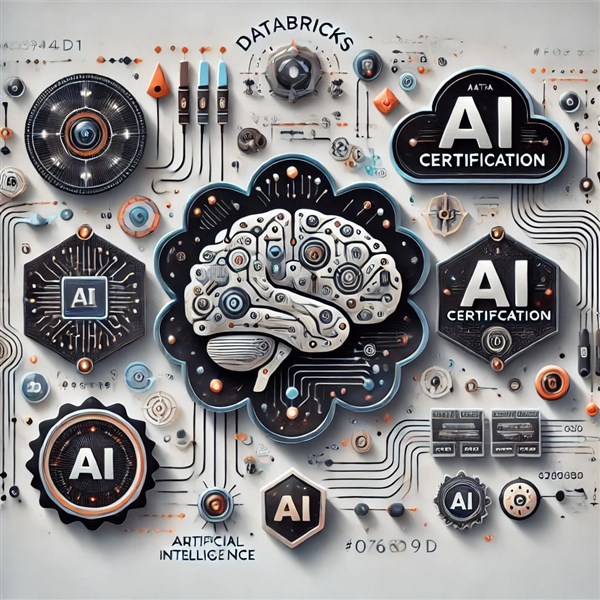Unable to find what you're searching for?
We're here to help you find it
The landscape of cloud computing is rapidly evolving—and artificial intelligence (AI) is at the heart of this transformation. As businesses embrace cloud-first strategies, the role of the Cloud Architect is expanding beyond infrastructure design to include AI and data-driven innovation. To stay ahead, cloud professionals need to integrate machine learning (ML), big data, and automation into their cloud architectures.
Enter Databricks AI Certification—a powerful credential that equips cloud architects with the skills to build scalable, intelligent data platforms using Databricks, the industry-leading unified data and AI platform.
In this post, we’ll explore what the certification covers, why it matters for cloud architects, and how it unlocks real-world use cases and strategic advantages for enterprises.
The Databricks AI certification track includes various role-based credentials, including:
For cloud architects, the most relevant certifications are the Lakehouse Fundamentals, Data Engineer Associate, and ML Associate, which validate your ability to:
It’s not just about theory. These certifications are designed around hands-on skills you’ll use daily when architecting modern AI-powered cloud platforms.
Here’s why this certification matters more than ever for cloud professionals:
As enterprises shift toward AI-driven decision-making, cloud architects must go beyond infrastructure setup and start enabling end-to-end AI workflows—from data ingestion to model deployment. Databricks gives you the tools to do just that.
The line between DevOps, DataOps, and MLOps is blurring. A certified cloud architect with AI skills becomes a cross-functional asset—capable of collaborating with data scientists, data engineers, and developers in a unified environment.
Databricks pioneered the Lakehouse—a data architecture that combines the best of data warehouses and data lakes. Understanding and implementing this architecture is now a must-have skill for cloud leaders.
Databricks integrates seamlessly with major cloud platforms (AWS, Azure, GCP). Certified professionals can design cost-efficient, auto-scalable, and high-performance solutions using Databricks-native tools and managed infrastructure.
Let’s look at how certified cloud architects are applying their Databricks knowledge in real-world enterprise settings:
A cloud architect builds a streaming data pipeline on Databricks using Apache Spark and Kafka. Incoming transaction data is scored in real-time using ML models deployed via MLflow. The architecture integrates with AWS Lambda to trigger alerts.
💡 Key Benefits:
Sensor data from IoT devices is ingested into Delta Lake, cleaned using Databricks notebooks, and passed through predictive models that forecast equipment failure.
💡 Key Benefits:
Customer behavior is tracked via clickstreams and transactions. Data is processed in Databricks and used to train recommendation models. The system serves real-time recommendations on the website using an ML endpoint.
💡 Key Benefits:
Large health records and claims data are processed in the Lakehouse using Delta Live Tables. Cloud architects ensure the architecture meets HIPAA compliance, automates reporting, and maintains audit logs.
💡 Key Benefits:
The Databricks AI certification introduces cloud architects to a rich stack of tools and technologies:
|
Tool / Concept |
Purpose |
|---|---|
|
Delta Lake |
Storage layer for structured streaming |
|
Apache Spark |
Distributed computing for big data |
|
MLflow |
ML lifecycle management |
|
Databricks SQL |
Query engine for BI and analytics |
|
Unity Catalog |
Centralized governance & access control |
|
AutoML |
Low-code ML modeling for quick wins |
|
Databricks Repos |
Git-based version control & CI/CD |
As a cloud architect, understanding how these tools fit into your architecture will allow you to create more flexible, modular, and AI-ready platforms.
Getting certified is more than a badge—it’s a career accelerator.
🎯 Career Benefits:
💼 Roles that benefit from Databricks AI certification:
Here’s a roadmap to help you get started:
Check the official Databricks certification page for the exam guide, domains, and sample questions.
Databricks offers free on-demand training for foundational concepts. This is great for cloud pros who are new to AI or ML.
Explore:
Most exams are proctored online and consist of multiple-choice questions based on real-world use cases.
🔚 Final Thoughts
AI is no longer optional in the cloud architecture world—it’s essential. With Databricks AI Certification, cloud architects can bridge the gap between data infrastructure and intelligent applications. You'll gain the skills to build cloud-native, AI-powered platforms that drive innovation, automation, and data-driven decision-making.
Whether you're working in finance, healthcare, retail, or manufacturing, Databricks gives you the tools to architect the future—and certification proves you're ready.
At Koenig Solutions, a leading IT training company, we offer comprehensive training programs to help you successfully achieve this certification.

Aarav Goel has top education industry knowledge with 4 years of experience. Being a passionate blogger also does blogging on the technology niche.










